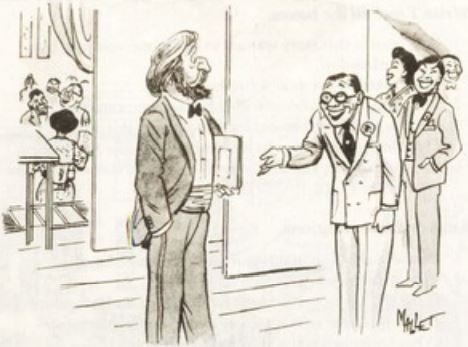


 Grammar
Grammar
 Tenses
Tenses
 Present
Present
 Past
Past
 Future
Future
 Parts Of Speech
Parts Of Speech
 Nouns
Nouns
 Verbs
Verbs
 Adverbs
Adverbs
 Adjectives
Adjectives
 Pronouns
Pronouns
 Pre Position
Pre Position
 Preposition by function
Preposition by function 
 Preposition by construction
Preposition by construction
 Conjunctions
Conjunctions
 Interjections
Interjections
 Grammar Rules
Grammar Rules
 Linguistics
Linguistics
 Semantics
Semantics
 Pragmatics
Pragmatics
 Reading Comprehension
Reading Comprehension|
Read More
Date: 17/9/2022
Date: 15/10/2022
Date: 19/10/2022
|

A famous writer who was visiting Japan was invited to give a lecture at a university to a large group of students. As most of them could not understand spoken English, he had to have an interpreter.
During his lecture he told an amusing story which went on for her a long time. At last he stopped to allow the interpreter to translate it into Japanese, and was very surprised when the man did this in a few seconds, after which all the students laughed loudly.
After the lecture, the writer thanked the interpreter for his good work and then said to him, now please tell me how you translated that long story of mine into such a short Japanese one.
"I didn't tell the story at all, the interpreter answered with a smile. “I just said, "The honorable lecturer has just told a funny story, you will all laugh, please."
A Which of these sentences are true (T) and which are false (F)?
Write T or F in the boxes.
B Answer these questions.
C Write this story. Choose the more suitable word each time.
My interpreter was not (young, youthful) (he was actually over 45), but he had a (young, youthful) face, a very black, (silky, silk) moustache and an orange (silk, silky) tie.
He interpreted in a loud, (confident, confidential) voice, although he had earlier confessed to me (confidentially, confidently) that he really felt very nervous.
Although he had little practice at interpreting, he was more (skillful, skilled) at translating s (imaginative, imaginary) language, and more (sensible, sensitive) to its sounds, than many a far more (skillful, skilled) interpreter. I particularly liked his translation of a poem about an (imaginary, imaginative) island called Lealoa.
|
|
|
|
تفوقت في الاختبار على الجميع.. فاكهة "خارقة" في عالم التغذية
|
|
|
|
|
|
|
أمين عام أوبك: النفط الخام والغاز الطبيعي "هبة من الله"
|
|
|
|
|
|
|
المجمع العلمي ينظّم ندوة حوارية حول مفهوم العولمة الرقمية في بابل
|
|
|